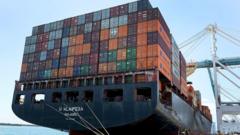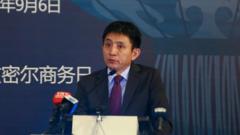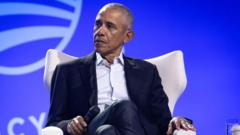**This article explores the parallels between President Trump's tariff imposition and Liz Truss's brief tenure, debating the potential implications for the U.S. economy.**
**Could Trump’s Economic Decisions Lead to His Downfall?**

**Could Trump’s Economic Decisions Lead to His Downfall?**
**Examining the Economic Impact of Trump's Tariff Policies Compared to Liz Truss**
In a surprising turn of events, Western leaders are responding to economic pressures with increasingly unorthodox policies, raising questions about stability. President Trump's recent decision to enact sweeping tariffs mirrors the turbulent phase experienced by former British Prime Minister Liz Truss, whose radical moves floundered within just 44 days in office.
Trump’s tariffs have sent ripples through financial markets, triggering concerns over the impending recession much like Truss's aggressive tax cuts did. However, the critical aspect that differentiates the two situations lies in governance dynamics: Truss’s rapid policy reversal came as she was ousted by her own party, a reflection of the responsive nature of Britain’s parliamentary system.
In contrast, Trump appears steadfast in his commitment to uphold these tariffs, often disregarding the negative consequences manifesting within the economy. Analysts have begun to question whether U.S. institutions can effectively respond to such stark leadership, contemplating the broader repercussions if these policies go unchecked. Jonathan Portes, a public policy expert, articulated concerns that a lack of flexibility might extend beyond the U.S., resulting in global ramifications.
This juxtaposition of leadership styles raises essential discussions about the future economic landscape and the structures in place that can either mitigate or exacerbate crises. Only time will tell if the United States will experience a similar reckoning as seen in the U.K., or if Trump's administration will weather the economic storm through defiance of prevailing financial logic.
Trump’s tariffs have sent ripples through financial markets, triggering concerns over the impending recession much like Truss's aggressive tax cuts did. However, the critical aspect that differentiates the two situations lies in governance dynamics: Truss’s rapid policy reversal came as she was ousted by her own party, a reflection of the responsive nature of Britain’s parliamentary system.
In contrast, Trump appears steadfast in his commitment to uphold these tariffs, often disregarding the negative consequences manifesting within the economy. Analysts have begun to question whether U.S. institutions can effectively respond to such stark leadership, contemplating the broader repercussions if these policies go unchecked. Jonathan Portes, a public policy expert, articulated concerns that a lack of flexibility might extend beyond the U.S., resulting in global ramifications.
This juxtaposition of leadership styles raises essential discussions about the future economic landscape and the structures in place that can either mitigate or exacerbate crises. Only time will tell if the United States will experience a similar reckoning as seen in the U.K., or if Trump's administration will weather the economic storm through defiance of prevailing financial logic.






















